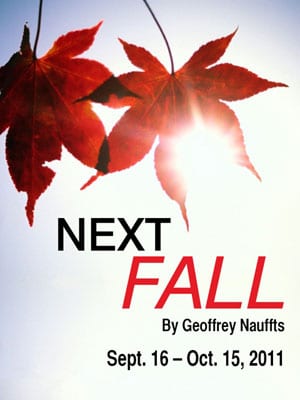Adam, a candle salesman in the midst of a midlife crises, can’t handle the idea that his lover could place anyone else above him. Even God. Perhaps, especially God, since God, to Adam, is a human invention used to oppress men with lovers like his. His lover is Luke, a struggling young New York actor and a southern Baptist, who knows how to compartmentalize. Luke accepts the notion that his relationship with Adam is a sin. He’s ok with this. We’re all sinners, after all.
It’s a rich conflict for a relationship drama and SpeakEasy’s outstanding cast proves it to be provocative and compelling—despite the fact that Geoffrey Nauffits’ script probably needed another edit or two. Although we know from the get-go that there’s a hospital involved, there’s a bit too much setup before any ticking clocks are heard. In general, the play has a few scenes too many, but the production is worthwhile because of the depth and insight these actors bring to their roles.
Adam, played by Will McGarrahan is a restless soul with an acerbic wit. Luke is the best thing in Adam’s life and their conflict over religion seems to be their one sore point. Adam picks and picks at the scab. After a while one gets the sense that as impossible a challenge as he makes it seem, he actually wants to be convinced—not of Christian dogma, but that there is an order to things, maybe even a protector of some kind.
How justified Adam is in obsessing over the issue might be more debatable if it weren’t for the fact that Luke, played by Dan Roach, is too frightened to come out to his parents. That which Luke believes God will understand, he can’t imagine his parents will. His fear becomes a bit more comprehensible when one meets his father, Butch, played by Robert Walsh. As the name crudely suggests, Butch is a formidable presence. His swagger, his grin, his steely glare and rumbling growl, project so much confidence that you almost subconsciously feel convinced that he is a man of judgment and wisdom. Then he gets talking and you get the creeping fear that he’s a powerful man who knows nothing.
Luke’s mother is Butch’s ex-wife, Arlene, a kind of aging Maggie the Cat figure. Amelia Broome is nothing short of brilliant in this role. She imbues Arlene’s desperate small talk with wells of subtext, and she rules every space she inhabits with carefully calculated body language.
Adam and Luke each get an ally in their fight. Adam’s is Holly, his boss at the candle store, played by Deb Martin. Holly, like Adam, is restless and searching. She’s a lapsed Catholic who seems to wear a New Age identity like a vintage frock picked up at a thrift store. Luke’s embrace of a religion that condemns his lifestyle is appalling to her, but so is Adam’s inability to get beyond it. So as an arbiter, she’s sort of our stand-in. Holly gets some good banter in. Luke’s ally, Brandon, played by Kevin Kaine, gets less to say. What we know, for most of the play is that he’s close to Luke, grimly serious, and clutches a Bible. Kaine is a fine actor and Brandon’s presence evens the seesaw, but the truth is, he probably doesn’t need to be in the play.
“Next Fall” raises questions about the purpose of religion and offers some familiar answers. The better questions it raises, which good acting helps make challenging and vital, are about which conflicting beliefs can be overcome in a relationship, how they can be overcome, and whether or not they should be.
“Next Fall” plays the Boston Center for the Arts through October 15.



Leave a Reply